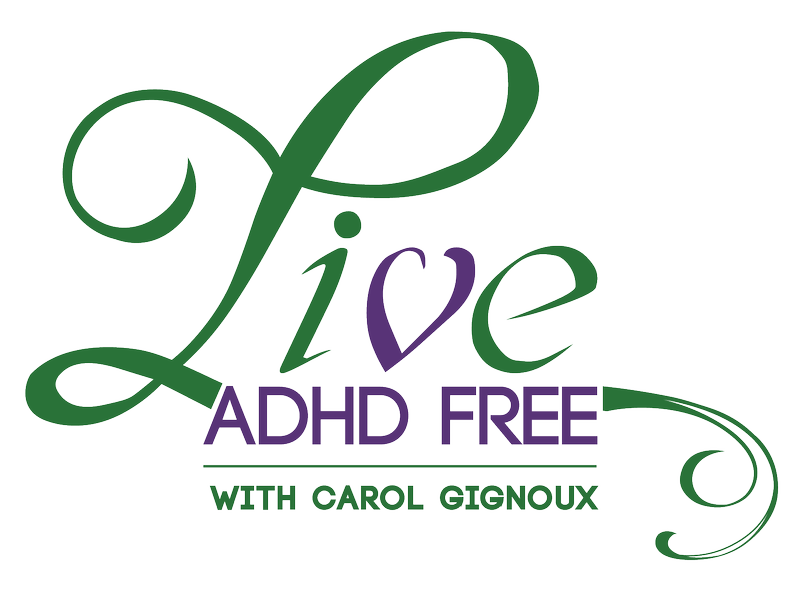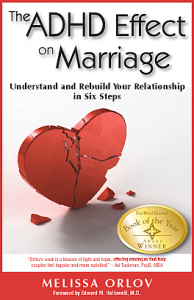 Melissa Orlov is a marriage consultant and the author of The ADHD Effect on Marriage.
Melissa Orlov is a marriage consultant and the author of The ADHD Effect on Marriage.
She teaches seminars for couples impacted by ADHD, blogs for Psychology Today and at www.adhdmarriage.com. She is considered a leader in the field, and has been interviewed by many national news organizations about the topic.
It appears that for ADHD couples to improve their partnership, they will need to hire outside professionals as part of their plan. Why is this true and can you elaborate?
Though some couples can do it on their own, most find they are too entrenched in bad patterns to repair their marriage without help or at least the support of others who are going through similar experiences. A good community is at my forum, but a professional who knows their stuff can be faster. The trick is finding a professional who understands ADHD because this is such a critical element of improving their lives. A good professional can help them identify what’s ADHD and what’s not; shepherd them through the process of optimizing treatment; and help them BOTH identify the problems they contribute to the relationship. In addition, someone familiar with ADHD and marriage can then coach them about specific tactics the couple can try to interact differently.
What I loved about your book was how you stressed the importance of each party taking responsibility for the issues in their relationship. You hear so much about how the person with ADHD needs to get help – it seems refreshing and actually more promising that each partner is working on their own contributions to the problems that exist. What results have you noticed from using this strategy?
It’s a much more realistic way to look at what’s going on, because it is never just one partner creating 100% of the problems. If you think you’re the exception to that rule, you’re in denial about your own role. The reason that coming to terms with the idea that both contribute to problems is so helpful is that it moves the couple away from the blame game. A non-ADHD spouse who admits that her frustration and anger are a problem, for example, validates the opinion of the ADHD partner (who agrees with this assessment) and opens the door for that ADHD partner to admit to his own role, too, without worrying that making this admission will mean that he will get blamed for all of their problems (a very real concern of people with ADHD that I come upon all the time.) On the other hand, if both partners insist upon blaming the other person, the only result is that they both feel attacked and defensive…not a good position from which to start to make changes!
In your book you give suggestions, tips and steps for ADHD couples to take to get back on track with positive communication. Within the busy lives of today, how can you advise couples on how to carve out enough time in their day and week to be able to use your multi step strategies?
The steps I lay out are actually consecutive and cumulative, so I suggest couples take them in a specific order and travel the “journey” of improvement together. That said, I think that couples who can’t make time to employ strategies that nurture and repair their relationship have their priorities in the wrong order. Most of the couples who come to me are in really dire situations – if they don’t make the time, their marriages will fail. Everyone has the same amount of time in a day…the only question is what’s most important to you. It takes a conscious decision to carve out that time to work together, but it’s a critical step. There is no way to put in effort against making change if you don’t have the time to do it. So for a counselor, a couple who says they can’t find the time is really a couple who is saying they don’t really care about fixing their problem.
I noticed in your book that you mention several times the need for the partners to make a radical shift in their thinking and behavior, especially where it concerns anger and negative communication patterns which tend to be quite deeply rooted. Do you have anything to share from your experience about the percentage of couples who have been able to successfully change these patterns?
A surprising number are able to make these shifts. The critical factor is actually whether or not each member of the couple comes to what I call their “Aha Moment.” This isn’t something I’ve written about in the book, but I do teach it in my therapist education course. For the ADHD spouse, the important Aha Moment is when they finally understand and internalize just how significantly their ADHD impacts their spouse. It’s always much more than they originally thought, and when they get it they usually say “That’s awful! I don’t want to do that to my spouse anymore!” At that point, the challenge becomes much easier – it’s a matter of finding the right treatments and strategies and working as a partner to interact better. But the MOTIVATION to do so is finally there because that Aha Moment has been internalized.
For the non-ADHD spouse, the Aha Moment is when they finally internalize that their anger, frustration, impatience and controlling behavior has a much greater impact on the relationship and their partner than they thought. When they finally get that, they realize that they can no longer tolerate themselves continuing that type of behavior – no matter how their partner behaves – because it’s just plain not who they want to be. Again, that moment gives the non-ADHD spouse the motivation they need to fix their own problems and acknowledge what their partner has said all along – it’s not just the ADHD.
If couples get to that point (and many do) then their chances of successfully improving their marriage go up exponentially. Once internally-driven, genuine motivation is in place for BOTH partners (not just one) they tend to make it.
Now that you have written this book, do you have certain hopes or wishes for the future of ADHD Couples?
There’s really good news in all of this. Even though ADHD can have such a devastating effect on a relationship, if you learn how to deal with it you can really turn things around. So my hope for ADHD-impacted couples is that they get the opportunity to go through that learning process. Generally speaking, that means 1.) they become aware of the ADHD in their relationship (80-90% of adults with ADHD are currently undiagnosed – so this is an important first step!); 2.) couples learn that they are not alone – there are many who struggle with the same issues and there is hope; 3.) they get well educated about the topic so they know to find help and learn how to change their relationship.
I read in your book that a certain amount of your experience and your research came from having an ongoing blog called www.adhdmarriage.com in which you interact with couples who are experiencing issues with ADHD in their relationship. Can you tell us how that works and how much it contributed to writing this book?
I probably should back up – the inspiration for starting the blog came after my husband and I struggled back from the brink of divorce and really turned our ADHD-impacted relationship around. There was so little information available -we just had to sort of stumble through it. I didn’t think everyone else should have to do the same thing! So I started the blog (with Dr. Ned Hallowell, though he’s too busy these days to contribute) just to share some of our experiences. It struck such a chord with people that it grew quickly and I was then asking myself “how can I organize this information so people can still have a meaningful ‘game plan’ for turning things around? The blog has so many thousands of pages – it’s easy to just wander around in it and sample, without obtaining insight into how to move ahead. So I wrote the book to create the coherent “here’s what you do” story. But I will tell you that it is the thousands of heartfelt stories that people shared there that inspired me to continue working on the book. So many people who were so grateful for the opportunity to interact with each other…I simply felt I had to write the book. And, then, I used their experiences in the book so that it wasn’t just about me. Their open sharing of their concerns and sorrows really allowed me to create ideas that were much bigger than just my personal experiences. That’s been a real strength, I think.
As you know, ADD Insights, LLC has a coaching and consulting component to its business model. Is there any expertise or words to the wise you would like to share with us regarding how we can best support couples with ADHD?
Coaching plays a very important role in helping ADHD spouses learn new ways to organize their lives, and in fact I encourage coaches to take the therapist CE phone seminar that Dr. Hallowell, Dr. Murphy, Sue Hallowell and I teach because we need as many professionals as we can get who are really familiar with the ins and outs of the dynamics of these relationships. In that course I organize counseling into three basic stages, the second one of which is primarily about learning new strategies – something that coaches are great at helping clients do. So I think that coaches can play a critical role, and will serve their clients best, if they are not only trained in coaching ADHD people to become more consistent and reliable partners, but also if they are aware of the psychological dynamics of the typical ADHD relationship so they can help their client maintain the inspiration they need to succeed.
Finally we want to know how writing this book has changed your life and how it has impacted your relationship with you husband who has ADHD?
Happily, my relationship with my husband was in good shape (finally, after a decade of real struggle!) before I wrote the book, and our relationship is truly wonderful now. If it hadn’t been, I think I wouldn’t have had the conviction needed to start writing about the topic in quite the way that I did.
The book is just one part of a huge change in career for me – I now work full time as a marriage consultant, blogger, author and teacher on the topic. I find the work tremendously fulfilling – it’s such a thrill when I talk with a couple that was barely speaking to each other but who can now report “wow, we had a really good week!”…and then another and another. I enjoyed my previous career, but this one is different. I’m thrilled to have the opportunity and privilege to help people improve their lives – and the lives of their children – so dramatically.


 Melissa Orlov is a marriage consultant and the author of The ADHD Effect on Marriage.
Melissa Orlov is a marriage consultant and the author of The ADHD Effect on Marriage.